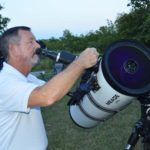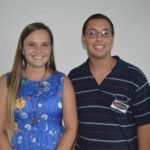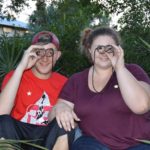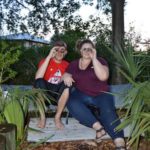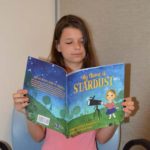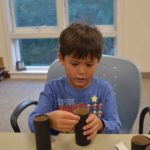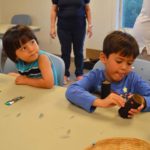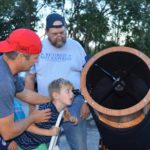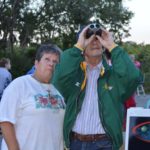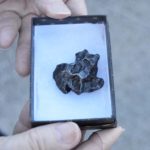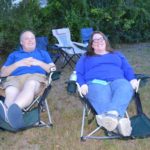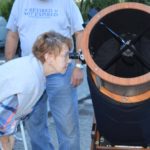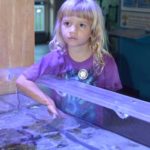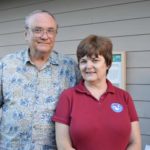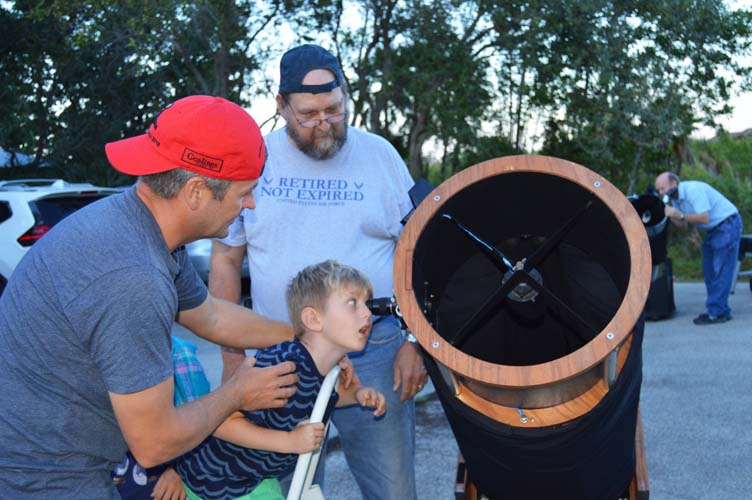
More than 200 starry-eyed astrophiles gathered at the Environmental Learning Center recently for an inaugural Perseid Meteor Shower & Star Party. The earlier storms that had rolled in cleared the skies and left an inky black canvas to serve as a backdrop for the evening’s light show.
Generally, ELC visitors immerse themselves in the natural surroundings during daytime outings to view the native flora and fauna. The campus is seldom open for nighttime events, making the Saturday evening experience even more interesting.
Sarah Christopherson, ELC naturalist, said a big part of the ELC mission is to get people outdoors to enjoy nature – at any time.
“When people think of the environment they think of trees and the water,” she said. “I’ve always thought of the night sky as a big part of the environment. This was a great opportunity for us to get people out there to enjoy the great outdoors.”
Christopherson said that the night sky is vitally important, explaining that the earth’s daily cycle of light and dark affects the reproduction, feeding and sleep cycles of plants and animals, while it also serves as a means of protection from predators.
Using the darkness as a platform, she shared information about the damaging environmental consequences of light pollution on humans, wildlife and climate change.
Before settling down on blankets and lawn chairs for the big show, children were kept busy making binoculars, listening to the story “My Name is Stardust,” visiting the touch tank and chatting with NASA Solar System Ambassador Melissa Sleeper.
Adults enjoyed listening to a talk on the Shuttle Era given by Adrian Palmer of the Brevard Astronomical Society that was accompanied by a slide presentation.
Once the sun went down, folks gathered in a clearing and all eyes were turned heavenward to glimpse the cosmic event.
To help aid in locating stars, planets and constellations, Christopherson suggested viewers use the SkyView app, and members of the Brevard Astronomical Society assisted by setting up high-powered telescopes for better viewing of the celestial bodies.
The Perseid Shower blasts across the sky each year during the Northern Hemisphere’s summer, as Earth passes through a string of debris from the Swift-Tuttle comet. The shower was named after Perseus the Hero, because the meteor trails meet within the boundaries of the constellation.
“This year’s shower is particularly spectacular because it coincides with the new moon, making the sky exceptionally dark for optimal viewing,” noted Christopherson.
On Sept. 15 the ELC will host National Estuaries Day, preceded by a Lagoon Cleanup in conjunction with the International Coastal Cleanup Day Celebration. For more information, visit discoverelc.org.
Photos by: Stephanie LaBaff
Click HERE to see more or buy photos
- David Guibert
- Sarah Christopherson and Adrian Palmer
- Walter and Molly Steinwald
- Matthew Smith and Allie Shabdue
- Matthew Smith and Allie Shabdue
- Victor and Elena Genel
- Genevieve Presti
- Declan Botson
- Finn Botson and Declan Botson
- Miranda Beulieu and Liz Mayo
- Scott Jones and son Maxwell with Fred Anderson
- Cathy Tocci and Ron Beaudoin
- Meteorite from Siberia.
- Scott and Karin Jones with children Maxwell and Marlee
- Jesika Alvarez and Jason Alvarez
- Jesika Alvarez and Jason Alvarez
- Valeria Vieira with Vanessa, Victoria, Ricardo and Roxana
- Mike and Kayla Zagorsky
- Nancy Hennig
- Cora Baumberger
- Carol Codd Brown and Liza Hunter
- Dawn Messina, Clay Reed, Nicholas Messina and Heather Messina
- Jack and Melissa Sleeper
- Cindy Wagner and Ken Diller

